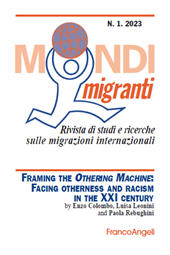Nation, Religion, and the Racial Exception : framing Difference in Turkey
41-60 p.
Nationalism presents a multitude of ways to talk about characteristics of its members and to view how these characteristics are formed in a timeless past. Populations identified as nations imagine themselves as sharing a collective identity and social solidarity. They form discourses offering ways of stipulating what defines nations in terms of collective characteristics, such as race, ethnicity, and religion. In many cases, these outright exclusive characteristics are subterranean, appearing in implicit forms and frequently combining with official claims regarding the civic and constitutional criteria for national membership. Turkish nationalism is no exception. While historical and contemporary examples of exclusion abound in Turkey's political history, they are countered with official claims of equal and open membership.
Often, these exclusions appear to be based on religion, as rules of inclusion present a preference for Muslims from Sunni backgrounds. Based on two case studies, this article argues that the relationship between nation and religion is mediated through the racial exception. When racial otherness is present, the overlaps between nation and religion may be negotiated, reinterpreted, or disregarded. [Publisher's text].
Il Nazionalismo utilizza una varietà di modi per parlare delle peculiarità dei membri di una nazione e per descrivere come questi caratteri si siano formati in un passato remoto. Popolazioni identificate come nazioni ritengono di condividere un'identità collettiva e solidarietà sociale. Creano discorsi che producono definizioni di nazione in termini di caratteristiche comuni, come razza, etnicità e religione. In molti casi queste caratteristiche esclusive sono sottese ed emergono in forme implicite e si combinano spesso con affermazioni ufficiali che riguardano i criteri civici costituzionali di appartenenza nazionale. Il nazionalismo turco non fa eccezione: esempi di esclusione sia passati che attuali abbondano nella storia politica turca e ad essi si contrappone la retorica ufficiale di apertura e accoglienza.
Spesso i processi di esclusione si basano sulla religione, poiché i Musulmani di origine sunnita vengono preferiti. Questo saggio si basa su due studi di caso e argomenta che il rapporto tra religione e nazione è mediato dalla variabile razza. Quando è presente una differenza raziale la sovrapposizione tra nazione e religione può essere oggetto di negoziazione, reinterpretata o ignorata. [Testo dell'editore].
Fa parte di
Mondi migranti : 1, 2023-
Articoli dello stesso fascicolo (disponibili singolarmente)
-
Informazioni
Codice DOI: 10.3280/MM2023-001003
ISSN: 1972-4896
MATERIE
PAROLE CHIAVE
- nazionalismo, appartenenza nazionale, religione, razzismo, Turchia
- nationalism, national membership, religion, racism, Turkey


